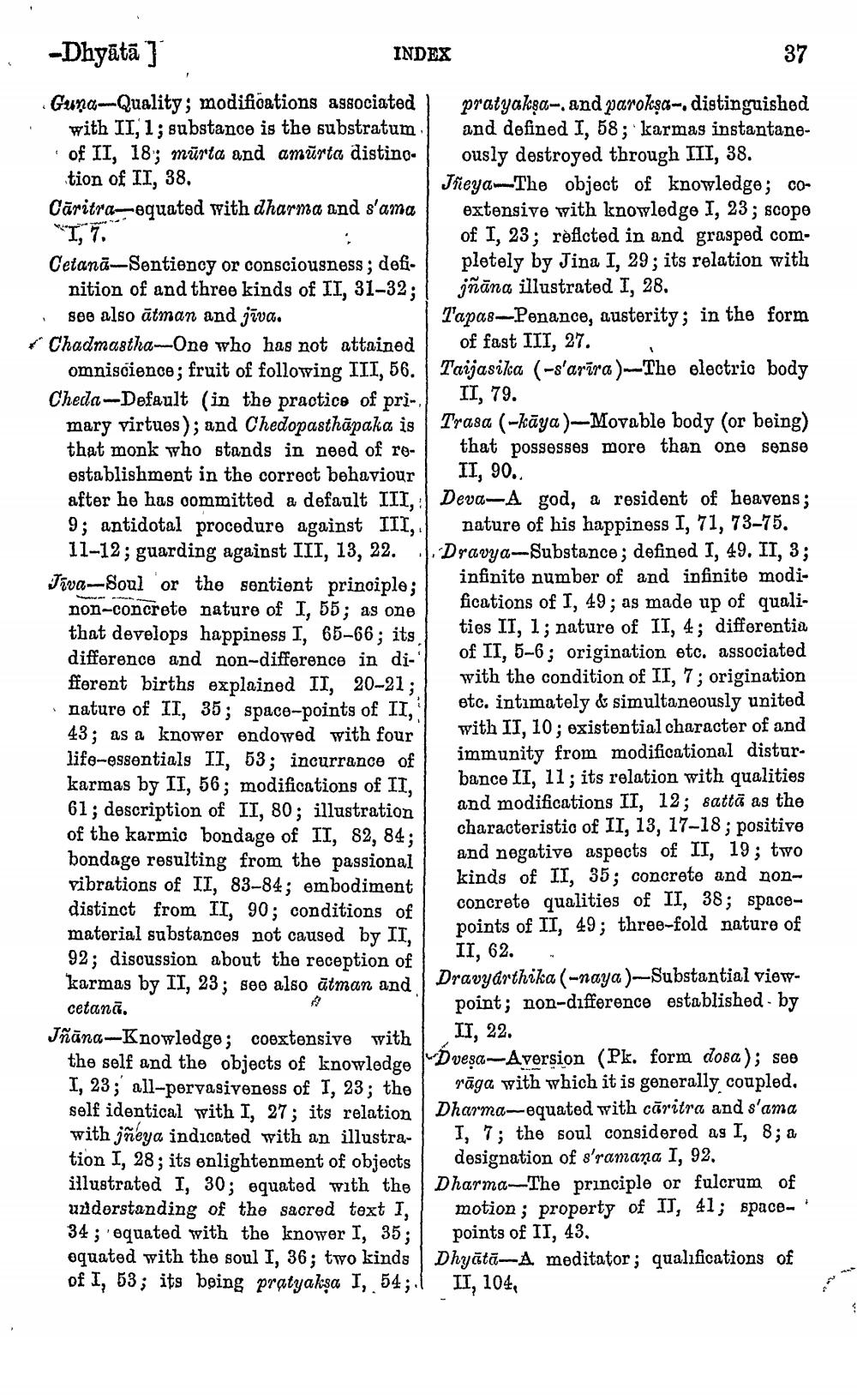________________
-Dhyātā]
Guna-Quality; modifications associated with II, 1; substance is the substratum of II, 18; murta and amurta distinotion of II, 38. Caritra-equated with dharma and s'ama I, 7.
INDEX
Cetana-Sentiency or consciousness; definition of and three kinds of II, 31-32; see also atman and jiva. Chadmastha-One who has not attained omniscience; fruit of following III, 56. Cheda-Default (in the practice of pri-. mary virtues); and Chedopasthapaka is that monk who stands in need of reestablishment in the correct behaviour after he has committed a default III, 9; antidotal procedure against III,. 11-12; guarding against III, 13, 22. Jiva-Soul or the sentient principle; non-concrete nature of I, 55; as one that develops happiness I, 65-66; its, difference and non-difference in di-' fferent births explained II, 20-21; nature of II, 35; space-points of II, 43; as a knower endowed with four life-essentials II, 53; incurrance of karmas by II, 56; modifications of II, 61; description of II, 80; illustration of the karmic bondage of II, 82, 84; bondage resulting from the passional vibrations of II, 83-84; embodiment distinct from II, 90; conditions of material substances not caused by II, 92; discussion about the reception of karmas by II, 23; see also atman and
#
cetana.
37
pratyaksa-. and paroksa-, distinguished and defined I, 58; karmas instantaneously destroyed through III, 38. Jieya-The object of knowledge; coextensive with knowledge I, 23; scope of I, 23; rèficted in and grasped completely by Jina I, 29; its relation with jñāna illustrated I, 28. Tapas-Penance, austerity; in the form of fast III, 27. Taijasika (-s'arira)-The electric body II, 79.
Trasa (-kaya)-Movable body (or being) that possesses more than one sense II, 90..
Deva-A god, a resident of heavens; nature of his happiness I, 71, 73-75. Dravya-Substance; defined I, 49. II, 3; infinite number of and infinite modifications of I, 49; as made up of qualities II, 1; nature of II, 4; differentia of II, 5-6; origination etc. associated with the condition of II, 7; origination etc. intimately & simultaneously united with II, 10; existential character of and immunity from modificational disturbance II, 11; its relation with qualities and modifications II, 12; satta as the characteristic of II, 13, 17-18; positive and negative aspects of II, 19; two kinds of II, 35; concrete and nonconcrete qualities of II, 38; spacepoints of II, 49; three-fold nature of II, 62.
Dravyarthika (-naya)-Substantial viewpoint; non-difference established by II, 22.
Dvesa-Aversion (Pk. form dosa); see raga with which it is generally coupled. Dharma-equated with caritra and s'ama I, 7; the soul considered as I, 8; a designation of s'ramana I, 92. Dharma-The principle or fulcrum of motion; property of II, 41; spacepoints of II, 43.
Dhyata-A meditator; qualifications of
Jñana-Knowledge; coextensive with the self and the objects of knowledge I, 23; all-pervasiveness of I, 23; the self identical with I, 27; its relation with jñeya indicated with an illustration I, 28; its enlightenment of objects illustrated I, 30; equated with the understanding of the sacred text I, 34; equated with the knower I, 35; equated with the soul I, 36; two kinds of I, 53; its being pratyakṣa I, 54;. II, 104,




